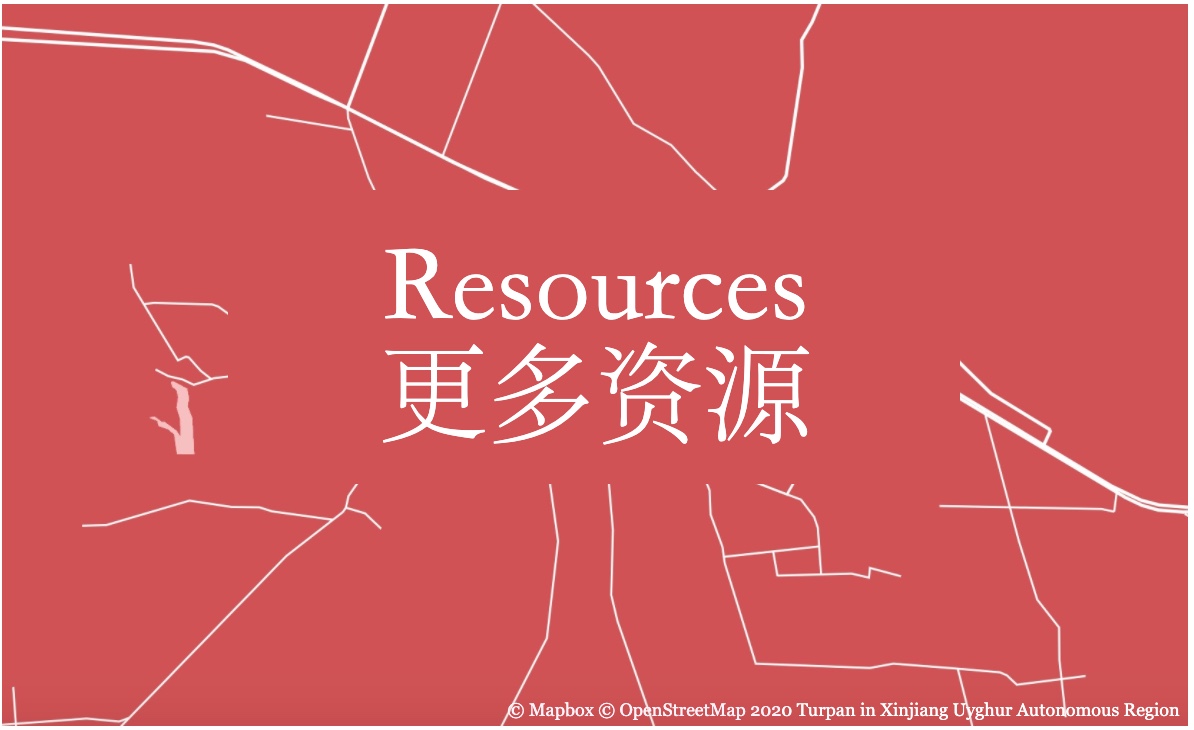Introduction
This section connects interested viewers to a range of external databases, bibliographies, and other research projects. Given the scope and complexity of the situation in Xinjiang, there are an array of initiatives working to shed light on the ongoing human rights crisis. This section introduces viewers to other projects and highlights their work.
Jump to:
Bibliographies • Blogs • Datasets • Organizations
Bibliographies
 |
Magnus Fiskesjö, Cornell UniversityBibliography of Select News Reports and Academic WorksThis bibliography contains an extensive list of sources related to the re-education camps and forced assimilation in Xinjiang. The list is constantly updated and suggestions for new additions are also welcome.
|
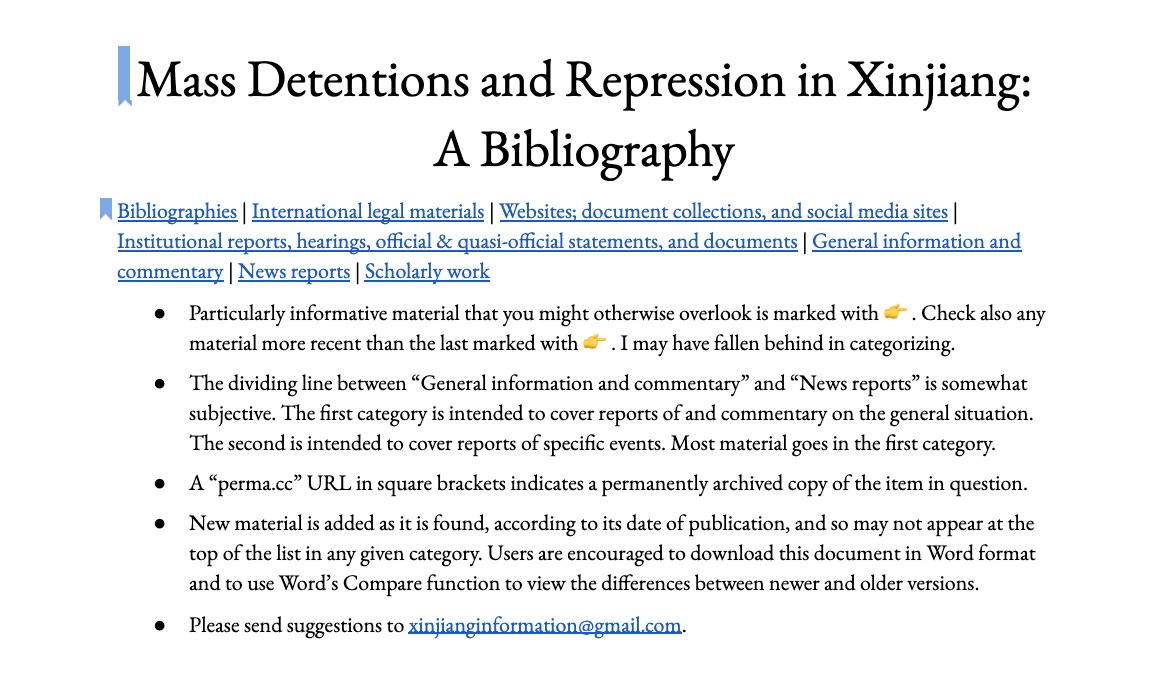 |
Xinjiang InformationMass Detentions and Repression in Xinjiang: A BibliographyThis bibliography hosts an array of sources that focuses on the extrajudicial detention of Turkic Muslim groups in Xinjiang. The resource includes sections on bibliographies, international legal materials, websites, institutional reports, official statements, general information, news reports, and scholarly work. This crowd-sourced effort is an ever-growing resource that allows readers to add additional relevant information.
|
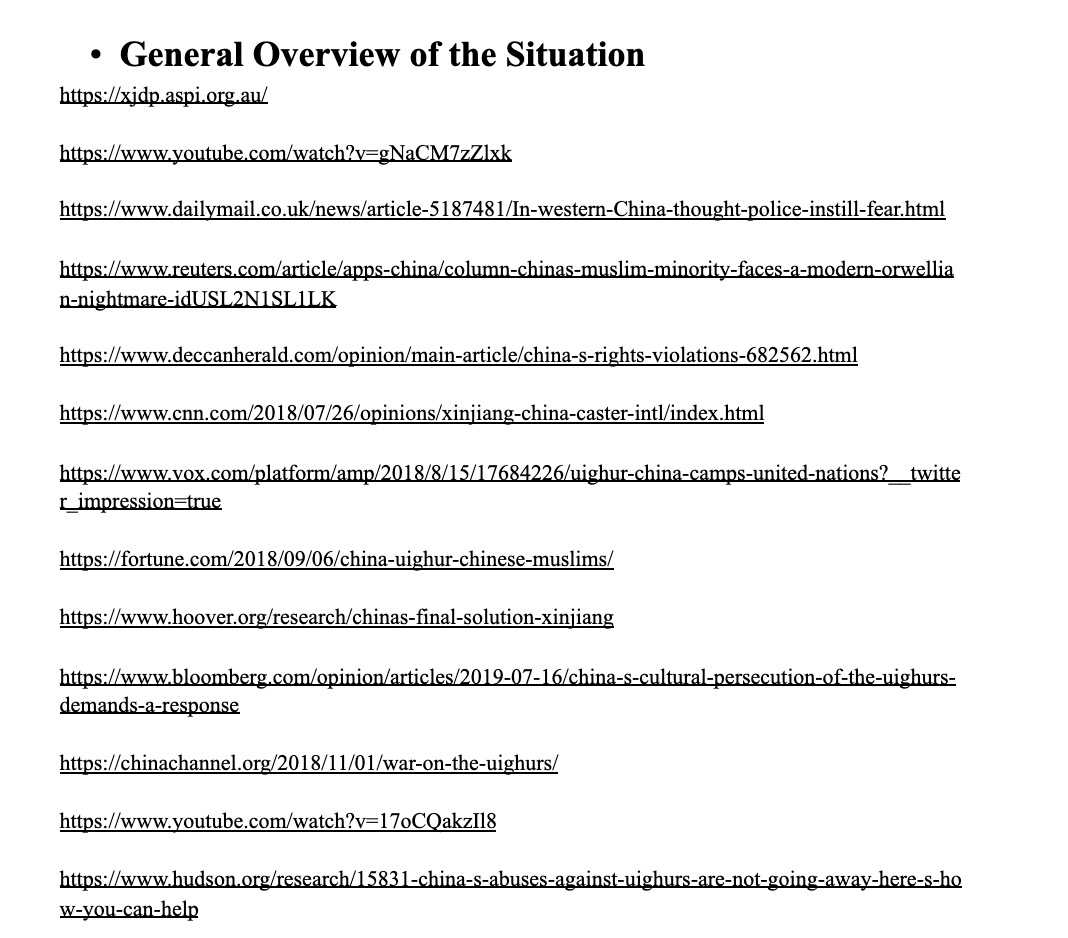 |
Kelly Hammond and Sophie Bonadeo, University of ArkansasOnline work on the situation in Xinjiang 2016-2020This bibliography covers a collection of online links focusing on international media coverage of the ongoing human rights crisis in the region as well as thematically categorized articles. This bibliography is a great introduction to the escalating situation in Xinjiang and provides a vast arrangement of news reports for readers looking to understand the global perspective on this issue.
|
Blogs
 |
Darren Byler, University of Colorado, BoulderDarren Byler’s Xinjiang Column on SupChinaDarren Byler, PhD, is a postdoctoral researcher at the Center for Asian Studies at the University of Colorado, Boulder. His research is centered on the technology and the politics of urban life in Central Asia. His column on SupChina focuses on societal conditions and human rights abuses in the Xinjiang region.
|
 |
Darren Byler, Art of LifeArt of Life in Chinese Central AsiaIn collaboration with Uyghur, Han, and Kazakh writers and other non-Chinese scholars and artists, Art of Life is a project led by Darren Byler, which shows the emerging art and politics in Central Asia. This collection of essays and artwork showcases the lived experiences of those living in Xinjiang as well as projects that highlight the ongoing human rights crisis. |
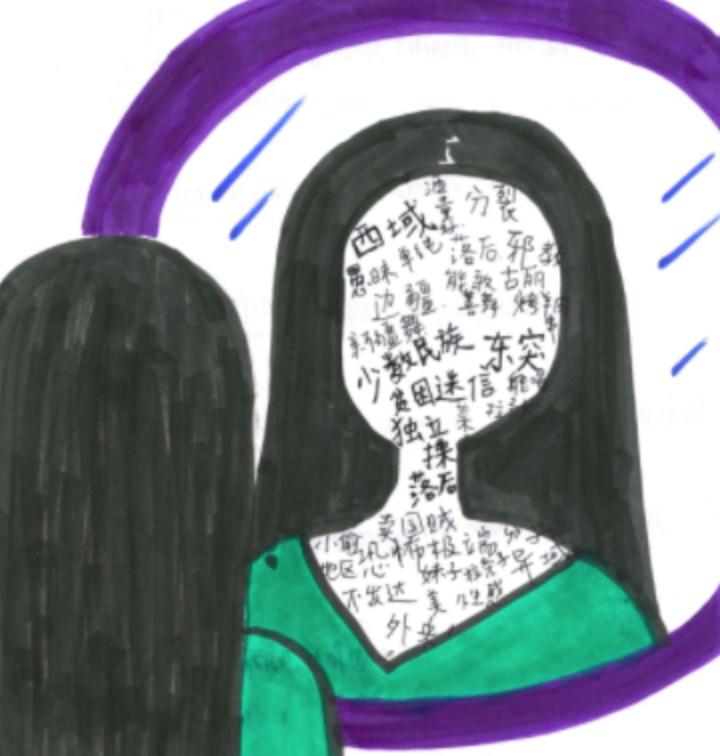 |
Guldana Salimjan, University of WestministerWhat China Studies Scholars Can Do about the Xinjiang CrisisGuldana Salminjan explores practical recommendations for scholars, academics, and students in China Studies interested in raising awareness about the ongoing situation in Xinjiang. One of her top recommendations included a call for volunteers to translate curated materials hosted by the project, which can be found here.
|
Datasets
 |
Alison Killing and Megha Rajagopalan, BuzzfeedXinjiang Camps DataAn updated spreadsheet with documented Xinjiang detention facilities can be downloaded from Killing’s and Rajagopalan’s GitHub – it includes the facilities that are part of the current program, those from pre-2016 and where there is corroborating evidence, links to that.
|
 |
China National Knowledge InfrastructureXUAR Economic, Social, and Developmental Statistics DatabaseThis CNKI database collects economic, social, and developmental data on Xinjiang. The collection, which covers periods as early as 1989 and as late as 2020, covers cities, regions, and the province as a whole, and also includes statistical yearbooks produced by the Xinjiang Production and Construction Corps (XPCC or Bingtuan).
|
Organizations
 |
Breaking Down the Xinjiang CrisisBreaking Down the Xinjiang Crisis is a blog run by Jake Eberts, a researcher based in Washington, DC, who also runs Bad China Takes Twitter account. The blog consists of short essays describing different aspects of the ongoing events in the region, as well as a collection of translations of the Cadre Blogs collected by Dr. Timothy Grose.
|
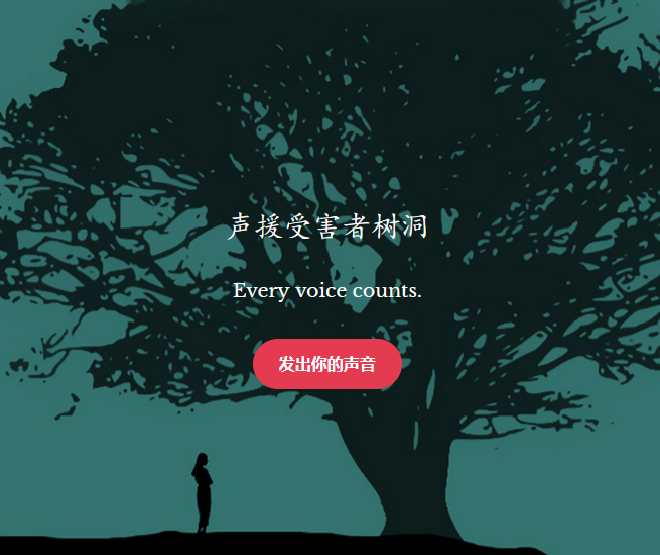 |
Chinese For UyghursChinese for Uyghurs (声援受害者树洞) is a repository of posts written by anonymous Han Chinese who wish to express solidarity with detained Muslims in Xinjiang and process their own feelings about the crisis. This resource is an invaluable archive that reveals the diversity of thought among Chinese who may not feel safe expressing their views in other venues.
|
 |
Hear Uyghur VoicesHear Uyghur Voices serves as an online platform for individuals of the Uyghur diaspora to share their personal stories and experiences of living through a crisis. This cathartic space allows for Uyghurs abroad to express feelings of deep trauma, resiliency, and the importance of being “keepers of culture”.
|
 |
Talking About XinjiangTalking About Xinjiang (我们一起来谈谈新疆) is designed to help facilitate discussion of extrajudicial detention in Xinjiang among a Chinese-speaking audience. The portal hosts personal testimonies and features collections of reports dealing with topics such as forced labour, “re-education” camps, and cultural destruction.
|
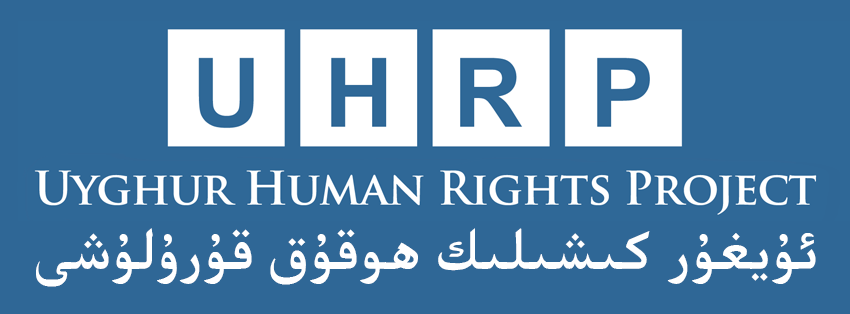 |
Uyghur Human Rights ProjectThe Uyghur Human Rights Project is a research-based advocacy group dedicated to promoting the human rights of Uyghurs in the Xinjiang region. The group publishes reports in English and Chinese focused on defending the social, cultural, economic, political, and civil rights of Uyghurs.
|
 |
Uyghur Pulse ProjectThe Uyghur Pulse Project is a YouTube channel where individuals provide video testimonies of victims who have been detained in the camps.
|
 |
Uyghur Transitional Justice DatabaseThe Uyghur Transitional Justice Database is a Norwegian-based project which records disappeared and extra-judicially detained Uyghurs in the East Turkestan region.
|
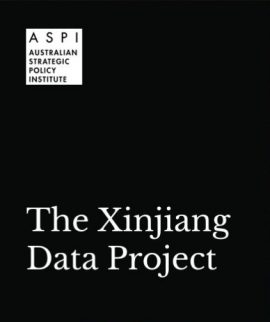 |
The Xinjiang Data ProjectThe Xinjiang Data Project employs a range of materials, from open-source satellite images to empirical research, to analyze the ongoing human rights abuses against non-Han populations in Xinjiang. The project focuses on the utilization of surveillance technologies to police non-Han communities, the proliferation of the “re-education campaign”, and forced labour practices within the supply chain. The project uses interactive mapping to highlight the creation of “mass internment camps” and the “deliberate destruction of cultural heritage sites”.
|
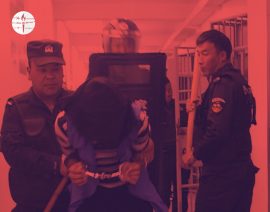 |
Xinjiang Police FilesThe Xinjiang Police Files are internal, confidential police documents, images, and spreadsheets leaked to anthropologist Dr. Adrian Zenz from an anonymous source. This collection of materials provides insight into the conditions, policies, and scale of re-education centers throughout the region dating back to 2018.
|
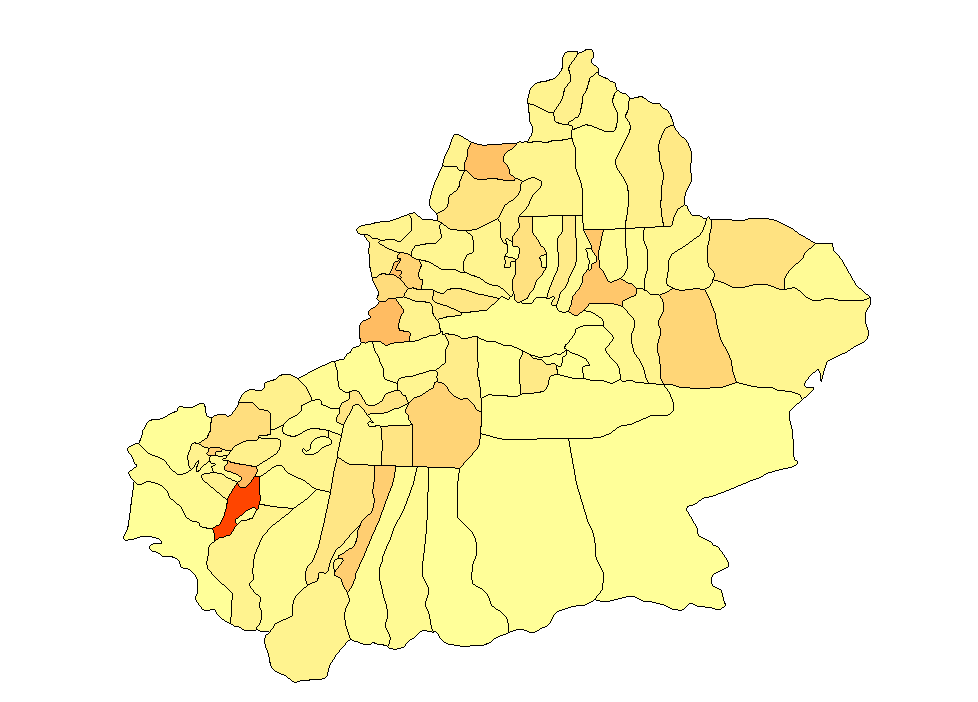 |
Xinjiang Victims DatabaseXinjiang Victims Database documents the individuals who have been arrested or disappeared by Xinjiang’s authorities since the beginning of the crackdown on the region’s Muslim population in 2017. In addition to its growing database of victims, this resource also hosts a valuable collection of primary evidence, including eyewitness accounts, letters, court documents, investigations, transcripts, and photographs.
|
Bibliographies
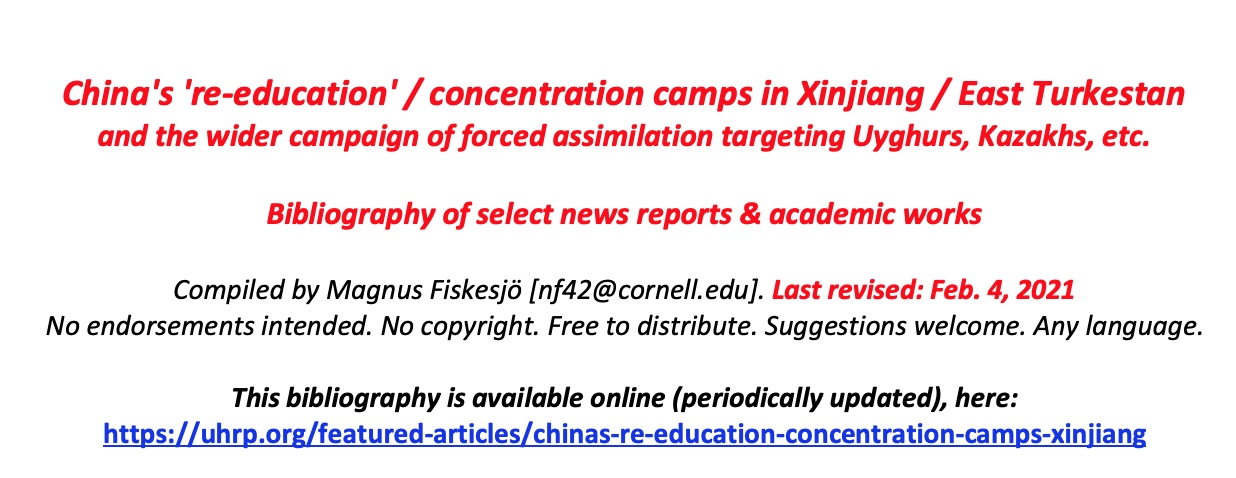
Markus Fiskesjö, Cornell University
Bibliographies of Select News Reports and Academic Works
This bibliography contains an extensive list of sources related to the re-education camps and forced assimilation in Xinjiang. The list is constantly updated and suggestions for new additions are also welcome.

Xinjiang Information
Mass Detentions and Repression in Xinjiang: A Bibliography
This bibliography hosts an array of sources that focuses on the extrajudicial detention of Turkic Muslim groups in Xinjiang. The resource includes sections on bibliographies, international legal materials, websites, institutional reports, official statements, general information, news reports, and scholarly work. This crowd-sourced effort is an ever-growing resource that allows readers to add additional relevant information.

Kelly Hammond and Sophie Bonadeo, University of Arkansas
Online work on the situation in Xinjiang 2016-2020
This bibliography covers a collection of online links focusing on international media coverage of the ongoing human rights crisis in the region as well as thematically categorized articles. This bibliography is a great introduction to the escalating situation in Xinjiang and provides a vast arrangement of news reports for readers looking to understand the global perspective on this issue.
Blogs

Darren Byler, University of Colorado, Boulder
Darren Byler’s Xinjiang Column on SupChina
Darren Byler, PhD, is a postdoctoral researcher at the Center for Asian Studies at the University of Colorado, Boulder. His research is centered on the technology and the politics of urban life in Central Asia. His column on SupChina focuses on societal conditions and human rights abuses in the Xinjiang region.

Guldana Salimjan, University of Westminister
What China Studies Scholars Can Do about the Xinjiang Crisis
Guldana Salminjan explores practical recommendations for scholars, academics, and students in China Studies interested in raising awareness about the ongoing situation in Xinjiang. One of her top recommendations included a call for volunteers to translate curated materials hosted by the project, which can be found here.
Datasets

Alison Killing and Megha Rajagopalan, Buzzfeed
Xinjiang Camps Data
An updated spreadsheet with documented Xinjiang detention facilities can be downloaded from Killing’s and Rajagopalan’s GitHub – it includes the facilities that are part of the current program, those from pre-2016 and where there is corroborating evidence, links to that.

China National Knowledge Infrastructure
XUAR Economic, Social, and Developmental Statistics Database
This CNKI database collects economic, social, and developmental data on Xinjiang. The collection, which covers periods as early as 1989 and as late as 2020, covers cities, regions, and the province as a whole, and also includes statistical yearbooks produced by the Xinjiang Production and Construction Corps (XPCC or Bingtuan).
Organizations

Breaking Down the Xinjiang Crisis
Breaking Down the Xinjiang Crisis is a blog run by Jake Eberts, a researcher based in Washington, DC, who also runs the Bad China Takes Twitter account. The blog consists of short essays describing different aspects of the ongoing events in the region, as well as a collection of translations of the Cadre Blogs collected by Dr. Timothy Grose.

Chinese For Uyghurs
Chinese for Uyghurs (声援受害者树洞) is a repository of posts written by anonymous Han Chinese who wish to express solidarity with detained Muslims in Xinjiang and process their own feelings about the crisis. This resource is an invaluable archive that reveals the diversity of thought among Chinese who may not feel safe expressing their views in other venues.

Hear Uyghur Voices
Hear Uyghur Voices serves as an online platform for individuals of the Uyghur diaspora to share their personal stories and experiences of living through a crisis. This cathartic space allows for Uyghurs abroad to express feelings of deep trauma, resiliency, and the importance of being “keepers of culture”.

Talking About Xinjiang
Talking About Xinjiang (我们一起来谈谈新疆) is designed to help facilitate discussion of extrajudicial detention in Xinjiang among a Chinese-speaking audience. The portal hosts personal testimonies and features collections of reports dealing with topics such as forced labour, “re-education” camps, and cultural destruction.

Uyghur Human Rights Project
The Uyghur Human Rights Project is a research-based advocacy group dedicated to promoting the human rights of Uyghurs in the Xinjiang region. The group publishes reports in English and Chinese focused on defending the social, cultural, economic, political, and civil rights of Uyghurs.

Uyghur Pulse Project
The Uyghur Pulse Project is a YouTube channel where individuals provide video testimonies of victims who have been detained in the camps.

Uyghur Transitional Justice Database
The Uyghur Transitional Justice Database is a Norwegian-based project which records disappeared and extra-judicially detained Uyghurs in the East Turkestan region.

The Xinjiang Data Project
The Xinjiang Data Project employs a range of materials, from open-source satellite images to empirical research, to analyze the ongoing human rights abuses against non-Han populations in Xinjiang. The project focuses on the utilization of surveillance technologies to police non-Han communities, the proliferation of the “re-education campaign”, and forced labour practices within the supply chain. The project uses interactive mapping to highlight the creation of “mass internment camps” and the “deliberate destruction of cultural heritage sites”.

Xinjiang Victims Database
Xinjiang Victims Database documents the individuals who have been arrested or disappeared by Xinjiang’s authorities since the beginning of the crackdown on the region’s Muslim population in 2017. In addition to its growing database of victims, this resource also hosts a valuable collection of primary evidence, including eyewitness accounts, letters, court documents, investigations, transcripts, and photographs.
